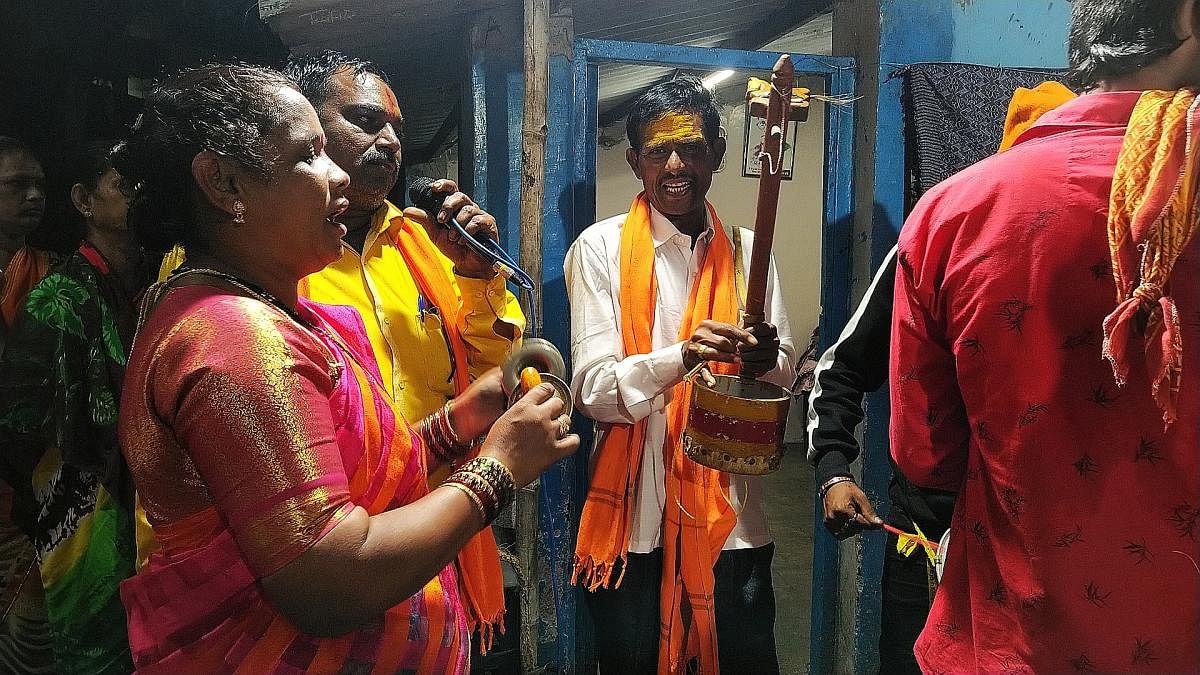
They sway with ecstasy generating dizzying tunes as they sing songs and play instruments, unique to their lot. The Gondhalis have been named after their mesmerising performances called Gondhal — a rare method of telling stories of mythology and folklore through lyrical songs. These traditionally nomadic performers sing devotional songs of praise for gods and goddesses in performances, which are deeply interwoven into the cultural fabric of West India.
As they struggle to retain ethnic folklore, traditional art and literature that otherwise risk extinction, the performances never lose relevance; not even in urban India. On an early evening, a small chawl in Mumbai’s historic Colaba precinct is abuzz with activity.
The narrow entrance is cluttered with footwear of all shapes and sizes. The otherwise-dark corners of the chawl are lit with halogen bulbs and decorative lighting. Men and women dressed in traditional Maharashtrian attire throng the area, eagerly awaiting for that ‘something’ excitedly, anticipating the arrival of the performers.
“We are here to see the Gondhal organised by our neighbours. I have never seen one before,” exclaims 22-year-old chawl-dweller Mansi Pawar who has come with her sister to attend the prasang (programme).
This time, it was the Kathar family that had invited the Gondhalis all the way from Nashik, 167 km away, for a jagran (night-long performance). The family had organised the prasang and invited relatives and neighbours. “My husband, a few of our elderly relatives and I recently visited Jejuri to seek blessings from our Kuldev (family deity) Khandoba, and upon our return, organised this prasang in devotion of Khandoba and Renuka Devi,” explains Sita Kathar. The programme started at 10.30 in the night and continued till 4 am.
For special moments
Every such occasion is a big event for the family where they put in all their resources to organise a ‘proper’ Gondhal. The performers usually charge anything between Rs 10,000 and 20,000 for an overnight recital by 6-8 members. Families call Gondhalis from far-flung places, especially from areas near the famous temples in Maharashtra.
“It was a very special moment for our family. We had organised a Gondhal for the first time,” says Vishal who could not contain his happiness and pride after the jagran. Although his sister got married earlier, she went to Jejuri where some key ceremonies were conducted. “Next time around, we will call the Gondhalis on the occasion of our son’s wedding,” exclaims Sita glancing at her son. Khandoba, a fierce deity and an incarnation of Lord Shiva, is worshipped mainly in the Deccan plateau region of India, particularly in Maharashtra. His main temple in Jejuri, near Pune, draws pious devotees from all over who worship him
with turmeric. Gondhalis are frequently invited by Maharashtrian families to their homes on auspicious occasions such as weddings, house-warming ceremonies, navratri, thread ceremonies, etc. “We still use traditional instruments — jhanjh, tasha, daphli, tuntuna, ektara, etc., during our performances,” says Gondhali Bhimabai Borade, who accompanies her
husband Gotiram Borade for the performances.
To welcome peace...
Gotiram, the main singer, recites folklores and sings devotional songs while his wife (a murali), accompanies him with jhanjh (cymbal) and dances along.
Other members of his troupe include those who play the Tuntuna or Ektara Veena (a string instrument with one string), tasha or dhol tasha (a percussion instrument) and daphli.
Gondhalis being nomadic tribals, are found primarily in Maharashtra, Madhya Pradesh, Karnataka and Andhra Pradesh and in places of worship and temples of regional Gods.
Worshippers of Renuka Mata, Tulja Bhavani and devotees of Khandoba, the Gondhalis perform to keep calamities at bay and to welcome peace, happiness and prosperity in life. The male performers are called Waghya, meaning tigers and female performers are called Murali.
They were originally dedicated to Khandoba. Today, the Waghyas and their female counterparts, Muralis, sing and dance in honour of the God, narrate his stories and express their devotion to the fiery deity.
Many Gondhalis have risen up in the socio-economic ladder and are well placed in different fields such as science, technology, law, etc. Goa-based researcher Shilpa Gondhali says, “many families have taken up different professions and vocations, but still perform Gondhals alongside their other vocations.” Despite the fast-paced life in urban India, the nomadic Gondhalis magically remain an integral part of traditional families and preserve age-old traditions and folklore. It’s their visits to urban settlements mandated by rituals during key occasions that help them retain their ethnic culture.